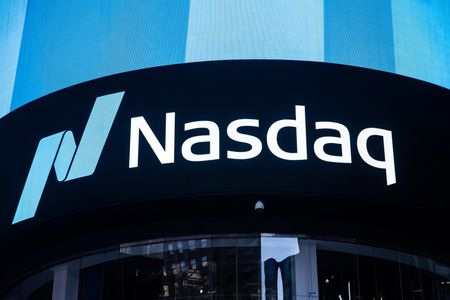 1
1 1
1
By Manya Saini, Anirban Sen and John McCrank
(Reuters) -Nasdaq on Monday agreed to buy Thoma Bravo-owned software firm Adenza for $10.5 billion, with the exchange operator’s biggest-ever deal broadening its financial technology footprint but giving shareholders a case of sticker shock.
Adenza’s risk management and regulatory software is primarily used by banks and brokerages and will help Nasdaq diversify further beyond its roots as an exchange operator, building on a spate of fintech deals in recent years under Chief Executive Adena Friedman, analysts said.
But Nasdaq’s shares tumbled over 10% to a nearly one-year low following the deal’s announcement as investors viewed it as an expensive bet.
We “have serious reservations about the price Nasdaq has chosen to pay for the asset,” Morningstar analyst Michael Miller said in a client note.
The deal values Adenza at almost 18-times its expected 2023 revenue. Nasdaq’s plan to issue $5.9 billion in new debt if the deal is approved by regulators would boost the company’s leverage well above previous high points following past acquisitions, he said.
S&P Global Ratings lowered Nasdaq’s long-term issuer credit ratings and its issue ratings on the company’s senior unsecured notes to ‘BBB’ from ‘BBB+’ on the news.
Nasdaq CEO Friedman said that because Adenza is a bit of an unknown asset, it will take time for investors to digest the details. Adenza was created in 2021 when Thoma Bravo merged Calypso Technologies with AxiomSL and is expected to generate about $590 million in revenue this year.
“We think we paid an appropriate price for an exceptional asset, but helping people understand how exceptional the opportunity is, I think, is going to take some time,” she said.
ACQUISITION SPREE
Nasdaq, like its peers, has been on an acquisition spree to diversify its portfolio of technology and intellectual property after regulations in 2005 opened the equities trading market up to competition from brokers.
Since then, Nasdaq’s acquisitions have included Nordic markets owner OMX for $3.7 billion in 2007, International Securities Exchange for $1.1 billion in 2016, content and analytics provider eVestement for $705 million in 2017 and anti-financial crime software firm Verafin for $2.75 billion in 2020.
“They consistently do a great job integrating these businesses,” said Rosenblatt Securities analyst Andrew Bond. “It’s been this 10-year journey, or strategic pivot, as they call it, to become more of a software, or SaaS-based, kind of business, versus a traditional exchange and transaction-based business,” he added referring to software as a service, or SaaS.
As part of the Adenza deal, Thoma Bravo will get a 14.9% stake in Nasdaq, making the private equity firm one of the company’s biggest shareholders.
Holden Spaht, a managing partner at Thoma Bravo who helped put the deal together, is expected to be appointed to Nasdaq’s board.
The debt Nasdaq will issue will bring its leverage to historically high levels for the company, which analysts said would weaken the company’s financial risk profile, though Nasdaq said it plans to bring down the debt levels considerably within 18 months. The deal is expected to close within six to nine months.
Nasdaq said buying Adenza is expected to increase the medium-term organic revenue growth outlook for its Solutions Businesses, which designs and develops financial software for investors, from 7%-10% to 8%-11%.
“The whole here as part of Nasdaq is worth more than the sum of its parts. There are revenue synergies with Nasdaq, there are expense synergies and Nasdaq is a great global brand that I think will accelerate sales in Adenza,” said Thoma Bravo’s Spaht in an interview.
Goldman Sachs & Co and J.P. Morgan Securities are financial advisers to Nasdaq, while Qatalyst Partners is lead financial advisor to Thoma Bravo and Adenza. Wachtell, Lipton, Rosen & Katz is serving as legal adviser to Nasdaq, while Kirkland & Ellis is serving as legal adviser to Thoma Bravo and Adenza.
(Reporting by Manya Saini in Bengaluru, Anirban Sen, John McCrank, David French and Milana Vinn in New York and Michelle Price in Washington; Additional reporting by Sruthi Shankar; Editing by Nivedita Bhattacharjee, Nick Zieminski and Lisa Shumaker)